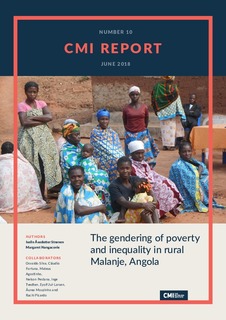| dc.contributor.author | Strønen, Iselin Åsedotter | |
| dc.contributor.author | Nangacovie, Margaret | |
| dc.date.accessioned | 2018-07-02T14:00:55Z | |
| dc.date.available | 2018-07-02T14:00:55Z | |
| dc.date.issued | 2018-01-01 | |
| dc.identifier | oai:www.cmi.no:6565 | |
| dc.identifier.citation | Bergen: Chr. Michelsen Institute (CMI Report R 2018:10) 42 p. | |
| dc.identifier.isbn | 82-8062-707-0 | |
| dc.identifier.issn | 0805-505X | |
| dc.identifier.uri | http://hdl.handle.net/11250/2504046 | |
| dc.description.abstract | This report is concerned with analyzing the gendered dimensions of rural poverty, based on qualitative and quantitative research in the rural municipality of Kalandula in the northeastern province of Malanje, Angola.
The report shows that rural women are more vulnerable to extreme poverty than their poor male peers. The cause for this is multidimensional, relating, amongst other factors, to the dearth of public support for social reproduction and rural livelihoods, the lack of venues for social mobility through education or income-generating activities, and the sway of patriarchal social ideologies and social organization. The report also documents that the economic crisis in Angola has had a direct negative impact on poverty levels in rural communities, in particular affecting already vulnerable women. | |
| dc.language.iso | eng | |
| dc.publisher | Chr. Michelsen Institute | |
| dc.relation | CMI Report | |
| dc.relation | R 2018:10 | |
| dc.relation.ispartof | CMI Report | |
| dc.relation.ispartofseries | CMI Report R 2018:10 | |
| dc.relation.uri | https://www.cmi.no/publications/6565-the-gendering-of-poverty-and-inequality-in-rural | |
| dc.subject | Angola | |
| dc.title | The gendering of poverty and inequality in rural Malanje, Angola | |
| dc.type | Research report | |
